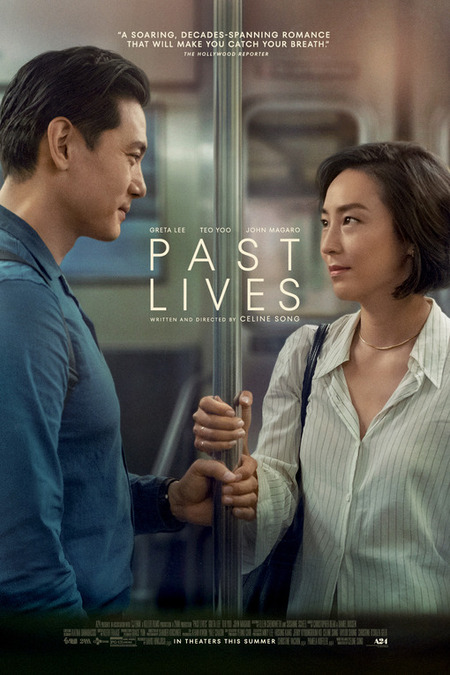(courtesy IMP Awards)
There’s something achingly affecting about the relationship many of us have with the past.
Whether it was a sad or happy time, and regardless of where it left us in the present, there’s a certain mourning that takes place, a melancholic nostalgia for what might have been which flourishes even in the face of resignation that that was then, this is now and that one can no longer have any material effect on the other.
That sense of acknowledgement of current realities and past regrets permeates every last scene in the ruminatively beautiful, Past Lives, a film written and directed by Celine Song that explores what happens between two people when they meet as adults after 24 years apart.
At 12 years old, Hae Sung (Seung Min Yim; as an adult he is played by Teo Yoo) and Na Young (Seung Ah Moon; as an adult played by Greta Lee) are not simply firm friends in Seoul where they go to school together but a budding young couple, attracted to each other despite their differences.
So profoundly obvious is their connection that their mother arrange a play date for them one day in the park, which cements their growing attraction to each other.
Alas, Na Young and her family emigrate to Toronto, Canada shortly thereafter in search of greater artistic opportunity, and Hae Sung, particularly devastated by the loss – the last time he sees Na Young, he is angry and upset and can only manage the most cursory “bye” before walking away and not looking back – and Na Young lose touch.
That is, until 12 years later when a certain social platform and the wonders of Skype reunite them for a while, a tenuous reconnection which doesn’t lead where Hae Sing hopes it will – he wants a renewed friendship, yes, but also the fulfillment of the nascent romance from years earlier – but which clearly underscores how much each means to the other and that what once flourished in the past still has life, warmth and vitality.
It’s at this point that one of the most likeable aspects of the film emerges.
In stark contrast to many films which paint reunions as almost flawless moments in time full of sparkling dialogue and a sturdy sense of past hopes articulated and present possibilities lived out, the first conversations between Na Young, now known as Nora Moon, and Hae Sung, are stilted and awkward, each burning with the need to reconnect but manifestly unsure how to do it.
That sense of fragile, awkward reconnection continues 12 years further hence when Hae Sung travels to New York City, where Nora lives with her Jewish writer husband Arthur (John Magaro) whom she met a decade or so later at an artists’ retreat, and the two meet up for a couple of days of playing tourist and settling the ghosts of the past.
Every single scene where the two are together speaks of how these kinds of moments actually play out – full of longing and melancholic longing and yet with the two parties separated by great distance, both physical and emotional, an inability to full bridge the gap between them.
It feels so sadly authentic, and while the two onetime close childhood friends want something more – friendship-wise it must be underlined; there’s no suggestion at any point that Nora is even remotely contemplating leaving Arthur for Hae Sung (Arthur does muse one night in bed if she might but she makes it clear that will not happen) and despite his hope, Hae Sung knows this too – all they can have it a strangely connective visit to the past in the landscape of a present that will never permit what it is might once have been.
It is so beautifully expressed and Past Lives is worth watching if only for the journey we go on with Hae Sung and Nora, one many of us have likely gone on in some form of another where we reach into the past hoping to fulfill its onetime potential in the present only to have to admit what we always knew deep down, that this can never happen.
Getting to that point is both a weird relief since we’re not freed from the burden of the past (though you sense Hae Sung, though understanding his load is lighter, would be happy if what he yearned for could exists in the present despite all indications to the contrary) and also a bitter sadness, evidence by the final scene which is heartbreakingly truthful in ways that leave you truly affected.
As an exploration of the strange contrariness that affects us as people wholly in the present and yet never truly free of the past and its many unrealised hopes and lingering regrets, Past Lives is in a class all its own, delivering up a story that lives in the quietly dramatic parts of our lives which may seem nuanced and uneventful but which surge with powerful emotions looking to go somewhere and be something.
In this case, it can never be more than an awkwardly resurrected friendship and watching as Hae Sung and Nora understand this from wholly different perspectives and yet with the same nostalgically regretful hold of the past is a journey into the deepest parts of our soul, the places where we have tucked away the events of years gone by, ostensibly closed off and yet begging for what was once hoped for to find new expression and fulfillment of onetime promise.
But that was then and this is very much now, and Past Lives exists quite wonderfully and affectingly in this space, a narratively simple film that packs a huge emotional punch, and which is, throughout its seamlessly insightful and gently rich near-two hour running time, a beautiful meditation on treasuring the past but realising it can never be the present, at least not in the way you imagine and possibly, sadly, not at all.
